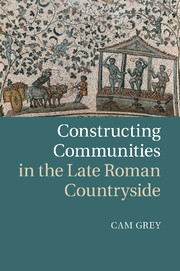Book contents
- Frontmatter
- Contents
- Preface
- List of abbreviations
- Map The late Roman world (sites and regions discussed in the text)
- Introduction
- Chapter 1 Constituting communities
- Chapter 2 What really matters
- Chapter 3 Small politics
- Chapter 4 Power as a competitive exercise
- Chapter 5 Resistance, negotiation, and indifference
- Chapter 6 Creating communities
- Chapter 7 Unintended consequences
- Conclusions
- Bibliography
- Index
Chapter 5 - Resistance, negotiation, and indifference
communities and potentates
Published online by Cambridge University Press: 07 September 2011
- Frontmatter
- Contents
- Preface
- List of abbreviations
- Map The late Roman world (sites and regions discussed in the text)
- Introduction
- Chapter 1 Constituting communities
- Chapter 2 What really matters
- Chapter 3 Small politics
- Chapter 4 Power as a competitive exercise
- Chapter 5 Resistance, negotiation, and indifference
- Chapter 6 Creating communities
- Chapter 7 Unintended consequences
- Conclusions
- Bibliography
- Index
Summary
Relationships between peasants and the powerful varied considerably in form and nature, and displayed great diversity in their terms and the foundations upon which they rested. In some circumstances, a group of peasants may be observed interacting as a collectivity with a figure power, while in others the influence of a powerful outsider might be enlisted by an individual in order to gain some advantage over his fellows. When these relationships are described in the sources, it is often in terms that evoke the concept of patronage, an enduring, mutually binding, intrinsically unequal relationship, underpinned by an ethos of reciprocity. This conscious enlistment of the language of patronage, evidenced in texts produced by both the powerful and the relatively powerless, amounts to one element in a continuous process of construction and reconstruction of relations between the two. However, these negotiations must be situated within the context of a broad range of interactions between peasants and the powerful, including the naked exercise of force to achieve domination, which can be met only by capitulation or compliance; overt or covert resistance or subversion on the part of subordinate populations; mutual manipulation, collusion, or collaboration; and purely incidental contacts between the two, which have consequences that are both unforeseen and unintended.
In this chapter, I will argue that the inhabitants of rural communities in the period did more than merely suffer the depredations of the military, accede to the wishes of the clergy, or satisfy the demands of the state and its aristocracies for taxes and rents. Rather, they emerge as conscious actors, both individually and collectively, whose decisions and behavior were able to impact upon the more powerful individuals with whom they came into contact. I will suggest, further, that their interactions with the powerful were characteristically motivated by a certain logic. That logic revolved around an individual’s impulse to obtain leverage against his fellows, a household’s imperative to balance its needs against its resources, and a community’s desire to maintain or regain its internal cohesion. These factors should be privileged over both the motivations of the potentates with whom these individuals, households, and communities came into contact, and the motives that those potentates impute to peasants in their accounts of those encounters.
- Type
- Chapter
- Information
- Constructing Communities in the Late Roman Countryside , pp. 148 - 177Publisher: Cambridge University PressPrint publication year: 2011

